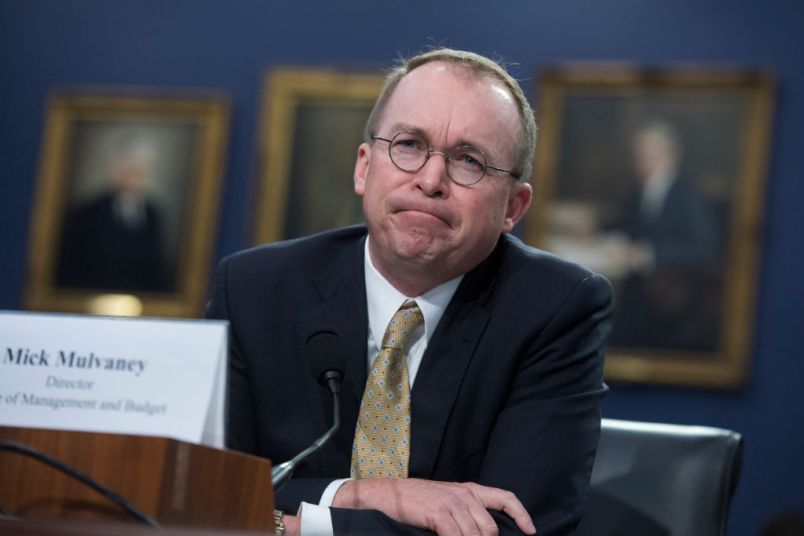The director of the Office of Management and Budget said Wednesday that his office would investigate the construction of a $43,000 soundproof phone booth in EPA Administrator Scott Pruitt’s office, the spending on which was found to be illegal by the Government Accountability Office recently.
Aside from that announcement, though, OMB Director Mick Mulvaney had few details to offer the House Appropriations Subcommittee on Financial Services during a hearing.
Asked what role his office played in overseeing such agency purchases, Mulvaney pointed to two recent scandals over expensive office furnishings: Secretary of Housing and Urban Development Ben Carson’s purchase — and then cancellation — of a $31,000 dining room set for his office; and Pruitt’s phone booth, which his agency has insisted is needed for secure phone calls, even though the EPA already has secure communications facilities.
“We take the antideficiency statute very, very seriously, and if they’ve been broken, we’ll follow the rules,” Mulvaney said, referring to the law prohibiting spending more money than what’s been appropriated. “We will enforce the law, and we’ll do so in a transparent fashion, Mr. Quigley. I’m not interested in covering for anybody else.”
The subcommittee’s ranking member, Rep. Mike Quigley (D-IL), asked where the investigations stood.
“That I don’t know,” Mulvaney said. “I know we just got the GAO thing. I was more prepared about the EPA because we just got that report this week. And I know we have not started our work. Have we—” he turned over his left shoulder to a staffer, who shook her head.
“Either we have not or we have just started our work on that.”
“Wait, I’m sorry, on which one?” Quigley asked.
“The EPA report, the GAO report,” Mulvaney said. “I don’t know where we are on the HUD one. It’s a little bit older, so my guess is we’re already into that one, but I can get back to you on that.”
After Quigley asked about possible repercussions for violating the Antideficiency Act, though, Mulvaney turned over his right shoulder to another staffer.
“HUD procurement didn’t happen?” he asked, seemingly confused.
“He stopped it,” the staffer said off-mic.
“That’s why I’m not aware about HUD,” Mulvaney said.
He said that while the Antideficiency Act is “technically” a criminal law, “I don’t think anybody has ever been charged criminally with a violation of the antideficiency statue.”
“But we would talk to the lawyers and figure out what the appropriate statutory steps are that we are supposed to take,” Mulvaney continued. “Again, we are going to be completely above-board on this one. I’m not any happier about it than you are.”
Quigley asked if there was any “education” that other Cabinet officials needed about the law.
“Are you taking a tack now to put the others on notice that they ought to be aware of this, but if not, here are the rules?”
“I think there’s a misunderstanding of the role that OMB plays,” Mulvaney said.
“It would not surprise me that something like this could happen at HUD or at EPA without us knowing about it,” he added. “That would be very unusual, I think, for us to know about something— Again, a large sum of money when you consider what was done, but in the greater scheme of government, not something that might rise to the level of sharing with the Office of Management and Budget.”
Quigley tried again: “Given what you’ve seen here and these episodes not standing in isolation, does it make sense to let the other agencies know that you’re concerned about this, and are you contemplating that?”
“Let me answer it this way,” Mulvaney said. “Earlier on we had some issues within the administration regarding the use of private air travel. And what we did there was, under the auspices of the chief of staff, was put out specific rules, guidelines, and also bringing to [folks’ attention] that the rules already exist. There are rules on this, just like for me, there are for you, in terms of when you can buy business-class travel, when I can pay for business-class travel. There are rules, I think they come out of [the Office of Personnel Management], on when we can do that.”
“To remind people of those rules, to clarify those rules, and to the extent the administration wants to go further on those rules, which I believe we have, to let folks know about that as well.”







Guy not performing his agency’s job softballing investigation of other guy not performing his agency’s job. Shocker.
Oh I’m sorry, I thought this was the Poop Train story.
“Let me explain”, he continued. “We don’t actually do any managing or budgeting at the Office of Management and Budget. We just show up and draw our paychecks just like everyone else in this administration. If something goes wrong, someone’s sure to tell us and then we’ll come here to Congress and stonewall you about it. You can’t really expect us to know about how the government spends its money and what for. There’s so much of it and we just want to get our share.”
Dammit, always someone beating me to the punch…
Question: Is Mulvaney drunk or incompetent or an idiot? Answer: YES!